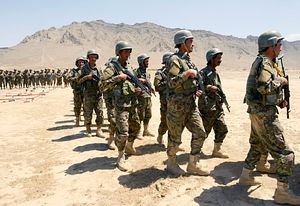Russia recently hosted a number of Afghan political groups to start a dialogue in order to develop consensus on major issues concerning Afghanistan’s security situation and political future. The meeting held in Moscow a week ago was noteworthy as it underscored the nature of Russia’s involvement in Afghanistan and what the country is thinking amid the direct talks between the United States and the Afghan Taliban. There are two key takeaways from the meeting that need to be highlighted.
First, Russia’s attempt to host the leadership of various Afghan political groups in the midst of the United States’ peace talks with the Afghan Taliban shows that Moscow is clearly concerned about what may come after Washington’s impending withdrawal from Afghanistan. Russia, like Afghanistan’s many neighboring states, understands that unless Afghanistan’s domestic warring factions develop a political consensus regarding the peaceful future of their country, Afghanistan is only a ticking time bomb.
Arguably, Russia recognizes that a sudden U.S. withdrawal from Afghanistan might lead to a repeat of the 1990s scenario whereby various Afghan ethnic, tribal, and nationalist groups formed militias. That can prove to be a perfect recipe for disaster. Moreover, in such a situation, the resurgence and expansion of the Islamic State in Afghanistan and beyond cannot be ruled out. Afghanistan’s other neighboring states such as China, Iran, Pakistan, and perhaps India too understand that while the Taliban at one point may have peddled instability in Afghanistan and the broader region, peace in the country cannot be achieved without the support of the group. Therefore, identifying and accepting the group as a major political actor is a first major step to bring together domestic political groups and the move also serves to reverse the Taliban’s fears of being branded as a terrorist group globally. While Moscow may not be opposed to the idea of Washington withdrawing its troops from Afghanistan, Russia is concerned about the post-U.S. withdrawal period, which has the potential to emerge as a major security challenge for Afghanistan’s neighboring states.
Second, while the heads of various ethnic groups, political figures, tribal chiefs, and the leadership of the Afghan Taliban were present at the Moscow moot, the Kabul regime did not join the talks. The fact that the Taliban and various opposition groups attended the Moscow talks without the Afghan government shows that the current government in Afghanistan doesn’t control the fate of Afghanistan’s future. Arguably, the Kabul regime is practically dependent on the loyalty and cooperation of various political and ethnic groups that are spread across Afghanistan and most of them don’t consider the current government a legitimate and influential actor.
For Russia, finding a solution to Afghanistan’s domestic woes cannot be left to a government that hardly has any say on the issues that may decide the future of the country. It’s a fact that the ongoing peace negotiations between the United States and the Afghan Taliban are taking place without the Afghan government playing any plausible role. The impending withdrawal of the United States forces from Afghanistan is being planned directly with the Taliban and other political stakeholders rather than with the Afghan government. Arguably, at this point, the Afghan Taliban and political groups that were part of the Moscow moot are more relevant to Afghanistan’s nonviolent future than the current government. It remains a fact that in Afghanistan any political figure ruling Kabul cannot enjoy widespread political support across the country unless it retains the support of all major domestic political, tribal, and ethnic factions. Unfortunately, the current government doesn’t have that kind of political leverage on its side. Thus, for Russia, the exclusion of the Afghan government from the Moscow peace talks may not be the desired option but, it’s not something that is going to become a reason for Moscow to hold or cancel talks with the Taliban or other domestic political stakeholders either.
Clearly, the withdrawal of the United States forces from Afghanistan is not going to bring stability to the country. Stability in Afghanistan can only return when all Afghans agree to steer the country toward a new course that promises peace not just for Afghanistan but also for its neighbors. Moscow’s motivations in organizing intra-Afghan dialogue are focused on stimulating such discourse.

































